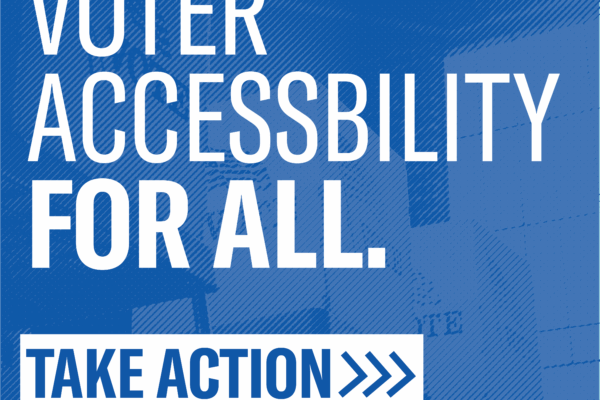This week, the Michigan Senate Elections Committee passed three bills that would create insurmountable barriers to voting for tens of thousands of qualified voters, especially Black and Brown people and the poor. In doing so, they are blatantly ignoring the unmistakable message sent by Michiganders when they overwhelmingly approved a voting rights amendment to the state Constitution less than three years ago: make elections fair and conduct them in a way that expands access to the ballot box.
Instead of respecting and honoring the clear intentions expressed by the electorate throughout Michigan, some legislators are using the phantom menace of voter fraud in a flagrant attempt to suppress the vote. It is a desperate ploy to retain power by any means necessary, no matter the damage done to democracy.
When Michigan voters changed the state Constitution in 2018 to make absentee voting available to every eligible voter and enacted other reforms that increased the number of people able to cast ballots and engage in democracy, they were telling lawmakers voting needs to be expanded, not curtailed. Yet Senate Bills 285, 303, and 304, and a likely ballot initiative strategy, do the opposite of what voters have said they want.
These three bills will rewrite Michigan’s current ID laws, undoing a system that has successfully served the state for more than a decade by carefully balancing election security and voting access. With no clear security benefit, and no evidence of systemic problems stemming from the current laws, the proposed changes will likely prevent tens of thousands of registered Michiganders from casting ballots. Many other eligible but unregistered voters will be discouraged from participating due to the added costs and administrative burdens these bills would create.
The bills also run contrary to the text and spirit of the Michigan and federal constitutions, and violate the federal Voting Rights Act.
All to address fabricated problems that simply do not exist.
Suppression Efforts Losing in Courts
Under current law, if a voter has no photo ID when they show up at the polls, they can submit an affidavit, signed under penalty of perjury, attesting to their identity and eligibility. The proposed changes would instead force voters who show up to vote without certain government-issued ID to submit a provisional ballot that will automatically be rejected unless the voter makes a second trip to their local clerk’s office to produce a qualifying ID and additional documentation within several days of the election. All of which is cumbersome and costly, creating unnecessary barriers, especially for low-income people and people without transportation.
In the 2016 presidential election, where the winning margin in Michigan was fewer than 11,000 votes, more than 18,000 voters relied on the affidavit option to cast their ballots. That alone, combined with the lack of any significant evidence of voter fraud related to affidavit ballots, provides more than enough reason to reject these bills.
But looking behind the overall numbers shows even deeper problems with these bills.
An analysis of Michigan voters relying on the affidavit ballot in the November 2016 general election by Dr. Daniel A. Smith, chair of the Department of Political Science at the University of Florida, found that voters living in entirely Black precincts were 16 times more likely to cast an affidavit ballot than voters living in precincts with no Black residents.
Discrepancies regarding photo IDs explains why: Minority voters in Michigan are about five times more likely to lack access to ID than white voters, according to an academic study of the 2016 presidential election.
Race isn’t the only factor, however. Mr. Smith’s analysis also reveals a similarly stark picture in terms of income, with roughly half of affidavit ballots cast in precincts with a median household income of $34,680 or less. These bills will disenfranchise Black and lower-income voters at staggeringly disproportionate rates.
The courts have certainly seen the negative and disparate impact similar laws aimed at suppressing the vote inflict and have acted accordingly.
In 2016, the federal Fifth Circuit Court of Appeals struck down a similarly strict voter ID law in Texas under Section 2 of the Voting Rights Act. That court found that the Texas law imposed “significant and disparate burdens on the right to vote” and affirmed the district court’s finding that the law had a “stark, racial disparity between those who possess or have access” to a qualifying ID and that the law had “a discriminatory effect on minorities' voting rights.”
The federal Fourth Circuit Court of Appeals also struck down as unconstitutional a strict voter ID law in North Carolina that targeted Black voters. And just last year, the Missouri Supreme Court also struck down a law that tightened voter ID requirements as violating the Missouri Constitution.
Will of the People
As noted above, Michigan voters in 2018 supported in overwhelming numbers an amendment to the state Constitution that provided greater protections to the right to vote both in-person and by absentee that “shall be liberally construed in favor of voters' rights in order to effectuate its purpose.”
The bills currently being considered not only disregard the desire of voters; they are a dangerous step in the wrong direction. Michigan residents – all of them – deserve much better.
For those who think a veto by Gov. Gretchen Whitmer is a sturdy firewall protecting the state from these anti-democratic efforts, think again. The speculation from Lansing insiders is that, should these bills fail to become law because of a veto, proponents will launch a ballot referendum that mirrors the current legislation. If they are successful gathering the requisite number of signatures to qualify for the ballot, legislators can jam changes through by preempting the process and voting the measure directly into law, a move that can’t be thwarted by a gubernatorial veto.
However they aim to achieve their goals, if our legislators choose racist voter-suppression techniques rather than full enfranchisement, we will vindicate voters’ rights in court. The Legislature should preserve taxpayer resources and protect the right to vote by rejecting these bills. More than unnecessary, they are designed to undermine the electoral process for partisan political gain. Everyone who believes in democracy needs to make their opposition heard.
Tell your Michigan Senator to protect your right to vote.


